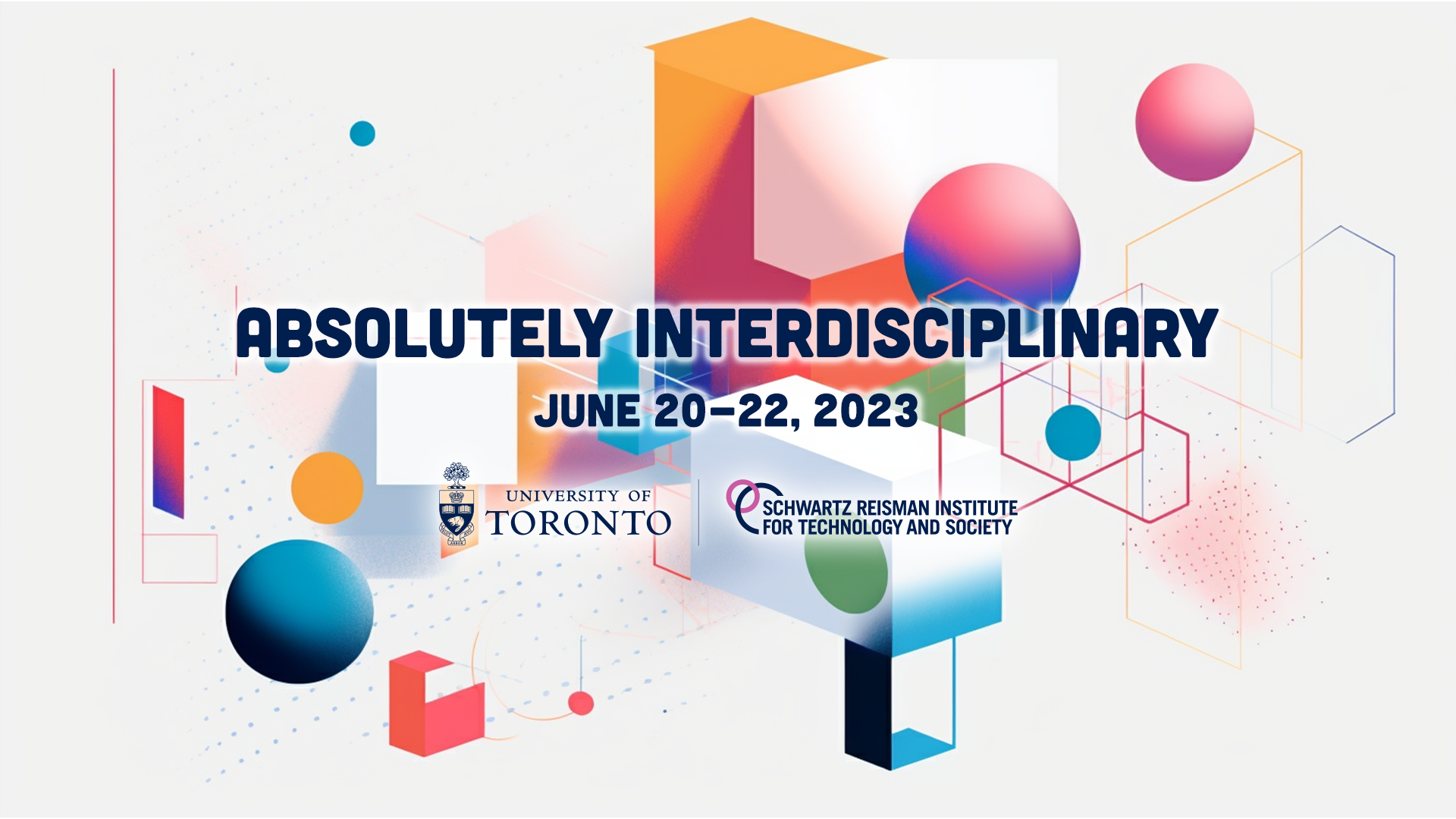An annual academic conference hosted by the Schwartz Reisman Institute for Technology and Society, Absolutely Interdisciplinary convenes leading thinkers from a rich variety of fields to engage in conversations that encourage innovation and inspire new insights.
Connecting technical researchers, social scientists, and humanists, Absolutely Interdisciplinary fosters new ways of thinking about the challenges presented by artificial intelligence and other powerful data-driven technologies to build a future that promotes human well-being—for everyone.
Conference participants will contribute to and learn about emerging research areas and new questions to explore. Each session pairs researchers from different disciplines to address a common question and facilitate a group discussion. By identifying people working on similar questions from different perspectives, we will foster conversations that develop the interdisciplinary approaches and research questions needed to understand how AI can be made to align with human values.
Venue
June 20th: Desautels Hall, Rotman School of Management, University of Toronto. Classroom 1065, second floor. 105 St George St., Toronto.
June 21st-22nd: Campbell Conference Facility, University of Toronto. 1 Devonshire Place, Toronto.
Main conference sessions will be broadcast online via Zoom webinar.
Schedule
June 20, 2023: SRI Graduate Workshop: The Limits of AI
In-person only at Desautels Hall, Rotman School of Management
9:30 AM – 1:00 PM | SRI Graduate Workshop (closed session, invitation only)
1:00 PM – 2:00 PM | Roundtable 1: How might AI surprise us?
2:30 PM – 3:30 PM | Roundtable 2: Do we want to limit AI?
3:30 PM – 4:30 PM | Reception
June 21, 2023: Absolutely Interdisciplinary Day 1
In-person at Campbell Conference Facility and broadcast online
9:25 AM – 9:30 AM | Opening remarks
9:30 AM – 10:30 AM | Keynote: Blaise Agüera y Arcas
11:00 AM – 1:00 PM | Session 1: Testing social cognitive theory with AI
2:00 PM – 3:00 PM | Session 2: Value alignment?
3:15 PM – 5:15 PM | Session 3: Large language models
5:15 PM – 6:15 PM | Reception
June 22, 2023: Absolutely Interdisciplinary Day 2
In-person at Campbell Conference Facility and broadcast online
9:00 AM – 9:05 AM | Opening remarks
9:05 AM – 11:00 AM | Session 4: The reward hypothesis
11:30 AM – 1:30 PM | Session 5: Machine learning in the workplace
2:30 PM – 4:30 PM | Session 6: AI and creativity
4:30 PM – 5:00 PM | Closing remarks
5:00 PM – 6:00 PM | Reception
Visit our conference website for the full schedule.
Speakers
Ashton Anderson, assistant professor of computer science, University of Toronto; research lead, Schwartz Reisman Institute for Technology and Society.
Blaise Agüera y Arcas, VP and Fellow, Google Research.
Lauren Bialystok, associate professor, Ontario Institute for Studies in Education, University of Toronto; acting director, Centre for Ethics.
William Cunningham, professor of psychology, University of Toronto.
Avi Goldfarb, Rotman Chair in Artificial Intelligence and Healthcare and professor of marketing, University of Toronto; chief data scientist, Creative Destruction Lab; research lead, Schwartz Reisman Institute; faculty affiliate, Vector Institute.
Paolo Granata, associate professor, Book and Media Studies, St. Michael’s College, University of Toronto.
Julia Haas, senior research scientist, DeepMind.
Gillian Hadfield, professor of law and economics, University of Toronto; director, Schwartz Reisman Institute; CIFAR AI Chair, Vector Institute.
N. Katherine Hayles, distinguished research professor of English, University of California; James B. Duke Professor of Literature Emerita, Duke University.
Joel Leibo, senior staff research scientist, DeepMind.
Nicolas Papernot, assistant professor of computer science, University of Toronto; faculty affiliate, Schwartz Reisman Institute; faculty affiliate, Vector Institute.
Ceceilia Parnther, assistant professor and program coordinator, Department of Administrative and Instructional Leadership, St. John’s University.
Daniel Rock, assistant professor of operations, information, and decisions, University of Pennsylvania.
Frank Rudzicz, associate professor of computer science, University of Toronto and Dalhousie University; scientist, St. Michael’s Hospital; director of AI, Surgical Safety Technologies Inc.; faculty affiliate, Vector Institute.
Avery Slater, assistant professor, University of Toronto; research lead, Schwartz Reisman Institute.
Richard Sutton, chief scientific advisor, Amii; professor, University of Alberta; distinguished research scientist, DeepMind; CIFAR AI Chair.
About the Schwartz Reisman Institute
Located at the University of Toronto, the Schwartz Reisman Institute for Technology and Society’s mission is to deepen our knowledge of technologies, societies, and what it means to be human by integrating research across traditional boundaries and building human-centred solutions that really make a difference. The integrative research we conduct rethinks technology’s role in society, the contemporary needs of human communities, and the systems that govern them. We’re investigating how best to align technology with human values and deploy it accordingly. The human-centred solutions we build are actionable and practical, highlighting the potential of emerging technologies to serve the public good while protecting citizens and societies from their misuse. We want to make sure powerful technologies truly make the world a better place—for everyone.

